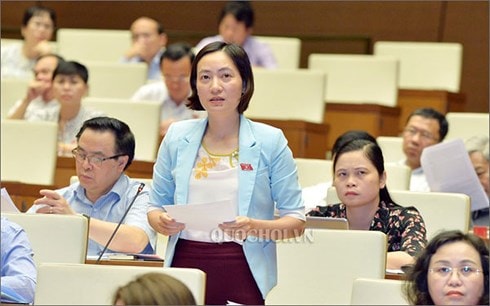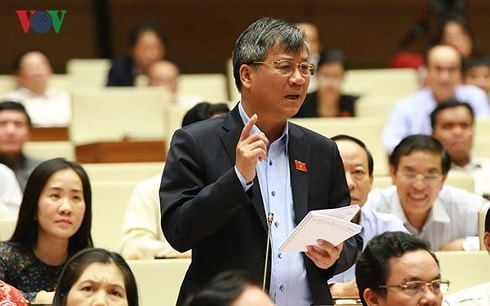Specialist doctors: Need to be clearly defined in the Law on Higher Education
Giving comments on the draft revised Law on University Education, delegate Vu Thi Nguyet said that many officials in the health sector feel like they are being left out of the training system.
On the morning of November 6, the National Assembly discussed in the hall a number of contents with different opinions of the Draft Law on amending and supplementing a number of articles of the Law on Higher Education.
Delegate Vu Thi Nguyet (Hung Yen delegation) expressed her opinion on the level and diploma of medical university education. Medical training is a special type of training in terms of time as well as diplomas and certificates.
|
| Delegate Vu Thi Nguyet. Photo: quochoi.vn |
To become a specialist doctor, in addition to 6 years of training in university, at least 2 to 3 years of specialized training in 2 directions are required. That is academic research training including: master's, doctorate and professional practice training including: specialist, subspecialty, resident doctor, specialist I and specialist II.
In addition, medical staff must be regularly trained and updated with knowledge. Learning for them is almost lifelong and never enough.
It can be said that for resident doctors, they are the elite, high-quality human resources of the health sector. For the type of training of specialists I and II, they are the main training source in examining, treating and taking care of people's health in hospitals.
These types have existed for decades and are recognized by the domestic and international education systems.
However, delegate Vu Thi Nguyet is concerned that the revised draft Law on University Education has omitted the medical degree and specialized diploma. In fact, this is not a new issue.
Article 39 of the 1998 Education Law has stipulated and provided specific instructions in sub-law documents, but for some reason, the following laws no longer stipulate this type of training or this type of diploma.
“I and many other health workers feel like we are being left out of the general training system and are very worried about not knowing where we stand and who recognizes us.
If this revised draft Law on University Education does not stipulate this, it may take another 10 years for people like us to continue our journey of finding ourselves because we have been forgotten by the law," said representative Vu Thi Nguyet.
Therefore, delegate Vu Thi Nguyet suggested that in the Draft Law on Higher Education Amendment, Article 6, Clause I should clearly stipulate the equivalent level of master's, doctorate or expert level. This is also consistent with the practice in the country and in the world.
The government should issue specific regulations on medical degrees.
Commenting on the above issue, delegate Nguyen Anh Tri (Hanoi delegation) said that Article 73 on medical training is assigned to the Government to regulate. This regulation is still general and vague, not yet applied in real life. Because it is not known when the Government will convene a meeting to implement the assessment of the remaining problems in medical training schools.
|
| Delegate Nguyen Anh Tri. |
Currently, the training of medical specialists is almost unofficial and not recognized. This can reduce the quality of medical training, making it difficult to integrate internationally.
According to delegate Nguyen Anh Tri, we need to unify the medical training model in Vietnam according to international training standards. A person who studies medicine for 4 years is called a medical bachelor.
Then, if they want to become a medical doctor, they will study in the clinical system and will continue to study for 1 year of residency and study for about 3 years of specialized training. Thus, they will study for 8 to 9 years, after graduating they will become a skilled specialist doctor, working in hospitals.
The second type is those who study for 4 years and then study for 2 more years to get a Master of Medicine degree. If they continue to study for 3 more years, they will get a Doctor of Medicine degree. These Masters and Doctors of Medicine teach at universities and they do not do clinical work.
These should be included in the revised Law on Higher Education. The government should also issue very specific regulations on study time, admission, and medical degrees to be able to implement them.



